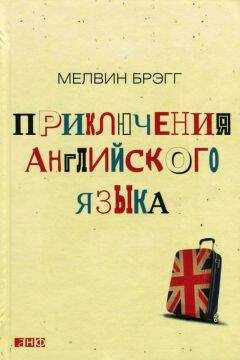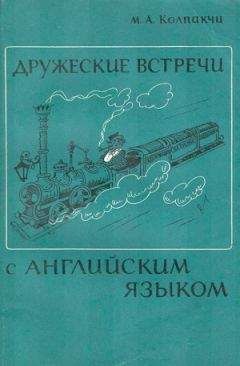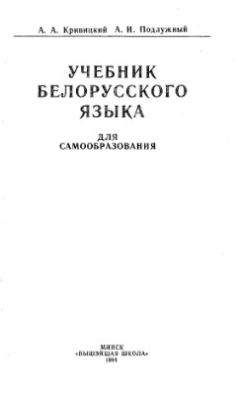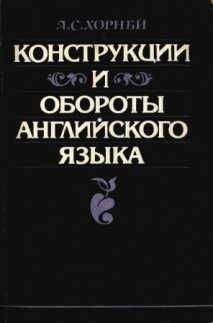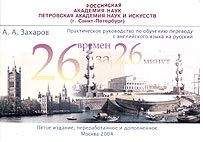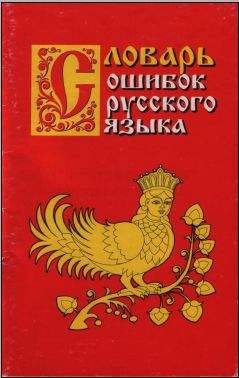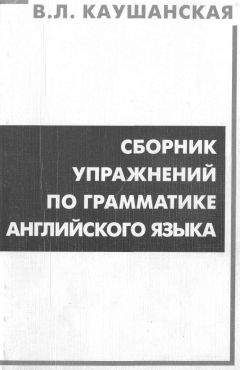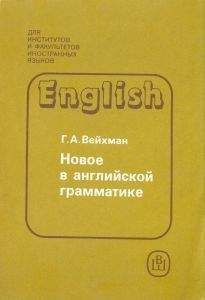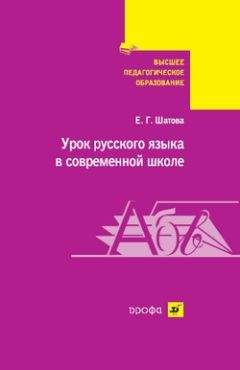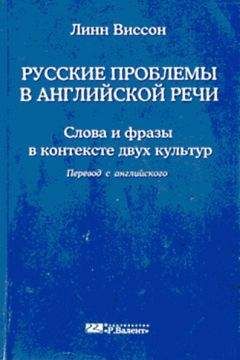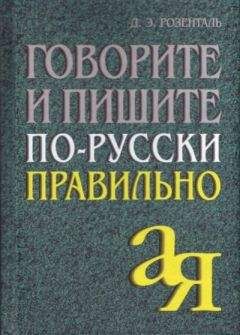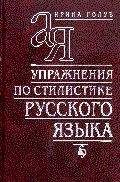Мария Аполлова - Specific English. Грамматические трудности перевода
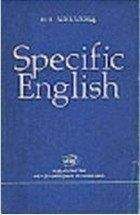
Скачивание начинается... Если скачивание не началось автоматически, пожалуйста нажмите на эту ссылку.
Жалоба
Напишите нам, и мы в срочном порядке примем меры.
Описание книги "Specific English. Грамматические трудности перевода"
Описание и краткое содержание "Specific English. Грамматические трудности перевода" читать бесплатно онлайн.
Пособие знакомит читателя с характерными особенностями английского языка и типичными случаями расхождений с русским языком. В нем суммируются те черты грамматического строя английского языка, которые в силу их специфики представляют трудность для учащихся.
В предлагаемом пособии ставится цель ознакомить учащихся, прошедших первоначальный курс английского языка, с некоторыми характерными системными особенностями этого языка и типичными случаями расхождений с русским языком. Поскольку способ выражения мысли проявляет себя прежде всего в строе языка, в его грамматике, то в пособии вскрываются именно особенности английской грамматики, притом те особенности, которые находили меньшее отражение, а главное — не подвергались достаточной отработке в учебной литературе.
Пособие не претендует на полноту и систематичность описания специфики английской грамматики, но обращает внимание учащихся на отдельные интересные, с точки зрения автора, моменты, которые и придают английской речи ее неповторимое своеобразие.
Кроме того, в пособии рассматриваются такие особенности английского языка, как конверсия, лаконизм английской речи, с одной стороны, и тенденция к известным усложнениям и избыточности — с другой, переходность глаголов и некоторые другие моменты.
Каждый раздел пособия содержит теоретические заметки с иллюстративными примерами в переводе автора. Пособие имеет упражнения, построенные на оригинальном языковом материале и направленные на закрепление практических и переводческих навыков.
Б. Переведите на английский язык; следите за тем, чтобы отрицание и наречие only занимали то место в предложении, которое обусловлено нормами английского языка.
1. Думаю, что у нас нет сейчас времени. 2. Я не всегда их одобряю. 3. Нам нужна только небольшая машина. 4. Полагаю, что Изабел не бывала в Париже. 5. Я видел его только три раза. 6. Они достали адрес только вчера. 7. Я думал не о вас. 8. Я провел там только одну ночь. 9. Том выглядел настоящим бродягой (a regular vagabond). Думаю, что и я выглядел не намного лучше. 10. Джейн родилась не в Ливерпуле. 11. Он действительно влюблен и так, как (the way) это бывает лишь раз в жизни (lifetime).
II. Переведите на русский язык следующие предложения с «двойным сказуемым».
1. The sun rose golden from the fume in the sea. 2. The waves rolled in pale and blue. 3. They kept far back from the great waves which reared up so huge and white that Harriet always rose and ran. 4. The mahogany furniture gleamed deep red like wine. 5. When the summer comes the hot sun bakes the earth brown. 6. His face flamed scarlet. 7. Behind the house, steeply disappearing into the night, a hill rose, covered with trees that still smelled of coal and glistened black. 8. The night was stormy and the wind blew cold from the mountains. 9. The jungle grew thick to the bank of a broad river. 10. She married young. 11. He came to socialism young. 12. The water was foaming white. 13. The red earth gleamed white as eiderdown in the sun – cotton, acres and acres of cotton!
III. А. Переведите следующие предложения с инфинитивом результата.
1. Startled, he looked up to find her smiling. 2. She swung the chair around to face Mel’s. 3. The door opened to reveal Albert Wells. 4. I was having a wash and a brush-up before starting out to go to the luncheon Elliott had invited me to, when they rang up from the desk to say that he was below. 5. The first time he had waked to feel the bed shaking with her sobbing, he had questioned, in alarm: «Dear, what is it?» 6. I could only rush out in time to find the wall splashed and the shop empty. 7. And then crassly, stupidly, you blunder in to announce you left your cigarettes in the car. 8. At last he got away, only to find that nothing was known of Coral at the hotel. 9. Matthew swung round to see, descending the steps like a Caesar among the legionaries, Herman Wohlgemutt. 10. He returned to find Ruddock in the step. 11. The kitchen door burst open and swung back to strike the wall with a noise like a pistol shot and Randall entered. 12. The freshened warm night air blew into the room and the night had cleared to reveal a star. 13. They had parted then, not to meet again. 14. He came home to see that all the problems had been already coped with.
Б. Переведите на английский язык следующие предложения, используя инфинитив результата.
1. Она встала раньше мужа и поехала на фабрику. 2. Я выскочил на улицу и увидел убегающего человека. 3. И тут он перебил ее, сказав, что они ничего не знают. 4. Она подняла глаза и увидела, что он улыбается. 5. «О!» – сказала она, и разочарование в ее голосе было разочарованием ребенка, который открывает коробку и обнаруживает, что она пуста. 6. В одно прекрасное утро он проснулся и почувствовал, что свободен. 7. Дверь гостиной резко отворилась, и вошла Милдред Финч (to admit). 8. Он вздрогнул, почувствовав руку Энн на своей руке.
IV. Преобразуйте следующие предложения в соответствии с данной моделью и переведите их на русский язык.
It’s kind of you to let me come with you. You are kind to let me come with you.
1. It was nice of you to think of it. 2. It’s silly of you to take it to heart. 3. He was aware that it was rude of him to refuse the invitation like that. 4. I believe it is unfair of you to speak so about your sister. 5. It’s awful of you to treat your guest like this, I’m sure. 6. It is mean of her to throw the reproach in his face. 7. I know it’s foolish of me to let myself go like this. 8. It’s kind of you to forgive me. 9. It would be uppish of me to put it that way, wouldn’t it? 10. It was awful of me not to remember her birthday. 11. How quick of you to notice! 12. «But it’s wrong of her to trust us, isn’t it?» said Randall eagerly. 13. How especially sweet of you to pity my abandoned state. 14. We think it’s very clever of you to have got up there. 15. She asked herself whether it would not have been wiser of her to pocket her pride and shut her eyes to the unwelcome truth. 16. I don’t think that’s necessary, John, though it was nice of you to take me out. 17. It was sweet of you to see me home. 18. It would have been stupid of her to pay a penny more than she had to. You’ve read the letter. It was mad of me to write it. It was right of you to tell me. 21. I think it’s real rude of you to say a thing like that.
V. Найдите сказуемые в следующих, предложениях и переведите эти предложения на русский язык.
1. She was proud to think that with her as a model he had made his first real success. 2. He was relieved to see that the first of the two extra trucks had arrived. 3. I was taken aback to find Edna’s secretary at her desk. 4. The artist had been quick to see that there was something modern and amusing in her proportions. 5. I was startled to hear him speak quite loudly. 6. I’ve been crazy to meet you. 7. She was impatient now to make the next call. 8. They never spoke alone and she was desperate to question him. 9. For long, ever since he had regained his health, Gray had been impatient to go back to America and get to work again. 10. Matthew was surprised to see both faces very faintly cloud over. 11. Dorothy, like a good many bad-tempered people, was quick to forgive affronts, so that she could start giving and receiving them again. 12. Maisie was careful not to reopen debatable matters, and they returned to London joyously. 13. She noticed that he was looking disturbed, and was careful not to speak to him. 14. She was interested to see how very disagreeable and ill-dressed many of the women visitors seemed. 15. In Austria we’ve been slow to recognise this in our ideological struggle. 16. Aggressive imperialist quarters were quick to notice this and they like it. 17. Then she was amazed to find herself tearful. 18. But he was shocked to find, now that it was suddenly released, how much sheer animosity he had in him against his young mistress. 19. Perhaps Douglas had been right to say that goodness was a state of unconsciousness. 20. She was frightened and a little shocked to find herself think in this way. 21. Ann was surprised to find how hard it was to bring herself to do so. 22. She grieved to find herself regarding Miranda’s presence in the house as almost menacing. 23. Ann had been shocked and indeed, frightened, to hear from Nancy Bowshott that Miranda had broken all her dolls. 24. He was sorry to have seen his father ineffectual, frightened, resigned. 25. Ann was surprised to discover that even in the midst of the acute pain she was suffering she did continue to think about Felix. 26. I was surprised to see him last night. 27. Yossarian was disappointed to learn that the lives of enlisted men were only slightly more interesting than the lives of officers. 28. I was somewhat taken aback to find so many people in the hall in which I was to speak. 29. I was more than a little intimidated to see a number of middle-aged and elderly persons, some of whom I suspected were members of the faculty. 30. I guess he was surprised to see Riley’s car, and surprised to find me in it.
VI. Переведите следующие предложения на русский язык, обращая особое внимание на перевод составных глагольных сказуемых.
1. I seem to know the play well enough. 2. Her name appeared to be Millicent Pole. 3. We happen to know that you came away with a woman. 4. Shakespeare seems to be reaching across the language barriers. 5. The garden, dissolved in granular points of colour by the intense evening light, seemed to quiver quietly before them. 6. Her hair seemed to have dried and stiffened into an iron-grey frizz. 7. She seemed to be saying that all the time now. 8. Emma seemed to be convinced. 9. The continuing dispute appeared yesterday to be as far from resolution as ever. 10. A sweet herbal scent seemed to emanate from the old velvet hangings. 11. She seemed to be trying to frame some important request. 12. They appeared to have a great deal to say to one another. 13. The rain seemed to be abating a little. 14. They seemed to be letters. 15. The trouble is the audiences don’t seem to like to think. 16. Dolly, for her part, appeared to be at ease and ejoying his company. 17. They seemed to be discussing a possible new landing-stage. 18. Do you happen to know who that man is? 19. She dwindled, appeared for the first time to question her boldness. 20. «Sex and violence seem to pay at the box-office, and therefore sex and violence abound in the theatre," – said Mr Brown. 21. In the first place, you must never forget a meal because you happen to be at work. And you mustn’t take a cup of tea and a biscuit in place of a regular dinner, because dinner happens to be a trouble. 22. On June 15, 1866, about four of the afternoon, the observer who chanced to be present at the house of old Jolyon Forsyte in Stanhope Gate, might have seen the highest efflorescence of the Forsytes. 23. None of the Forsytes happened to be architects.
VII. Переведите на русский язык. В каждом предложении укажите сказуемое.
1. Не frightened this man Ridvers into agreeing to pay the claim for damages. 2. «Who on earth» – Inigo began, but was immediately kicked into silence. 3. His look disturbed her to knowledge of him. 4. The unfortunate boy had not only been cheated of the love he thought he had won but also of his high hopes of honour and glory on the field of battle. 5. Scarlett was reproved into silence. 6. Flambeau seemed suddenly galvanised into existence. 7. He would not, he told himself, be goaded into losing control. 8. «Your what?» I said, startled out of my politeness. 9. She teased him into excitement and then snubbed him for being rough. 10. I felt somewhat discouraged into silence. 11. Well, if you’re going to bully me into being logical and consistent, I should suggest that their love is of a different kind. 12. Tonight, in an attempt to cheer herself out of a state of rank misery, she had worn it. 13. He may have suspected that she’d lured him coldly into making the sacrifice that was to save her.
VIII. Переведите следующие предложения на русский язык, обращая особое внимание на перевод выделенных слов.
1. Не heard me clatter down the wooden staircase. 2. And Colonel Cathcart had roared away as abruptly as he’d come, whipping the jeep around with a vicious spinning of wheels. 3. She staggered blindly into the street. 4. The young men sparkled down the skislopes like lovely little aeroplanes caught in the sun. 5. Cooper flushed, did not for a moment know what to say or do, turned on his heel, and stumbled out of the room. 6. Each plane purred loudly along the runways. 7. She stormed up the stairs. 8. So I decided to pedal down to the station.
Обстоятельство
В разделе о сказуемом мы говорили о том, что наречия делятся на количественные и качественные, и обстоятельства, выраженные количественными наречиями, стоят непосредственно при сказуемом, так же как и отрицание. В самом деле, действие может иметь место (I speak English), может не иметь места (I don’t speak English), может иметь место лишь ограниченно, в определенной степени (ever, often, sometimes, only и т. д.), поэтому естественно, что все количественные наречия-обстоятельства стоят при глаголе-сказуемом.
Качественные наречия, служащие для выражения обстоятельства образа действия, характеризующие действие в целом и тем самым относящиеся как бы ко всей мысли, выраженной в предложении, стоят, как правило, в конце или – иногда – в начале предложения.
В английском предложении строго определено и место обстоятельства времени и обстоятельства места. Обстоятельство времени ставится в конец предложения, и ему предшествует обстоятельство места.
I’m leaving for London tomorrow.
Когда же движение (действие) уже начало описываться в предыдущем предложении, то в качестве указателя на последовательность действий обстоятельство времени может занимать первое место в предложении. Например:
Then…
At a quarter past six…
To же самое происходит с обстоятельством места, главным образом, при последовательном описании, но выдвижение его (особенно распространенного обстоятельства) на первое место в предложении часто влечет за собой инверсию.
Подписывайтесь на наши страницы в социальных сетях.
Будьте в курсе последних книжных новинок, комментируйте, обсуждайте. Мы ждём Вас!
Похожие книги на "Specific English. Грамматические трудности перевода"
Книги похожие на "Specific English. Грамматические трудности перевода" читать онлайн или скачать бесплатно полные версии.
Мы рекомендуем Вам зарегистрироваться либо войти на сайт под своим именем.
Отзывы о "Мария Аполлова - Specific English. Грамматические трудности перевода"
Отзывы читателей о книге "Specific English. Грамматические трудности перевода", комментарии и мнения людей о произведении.





